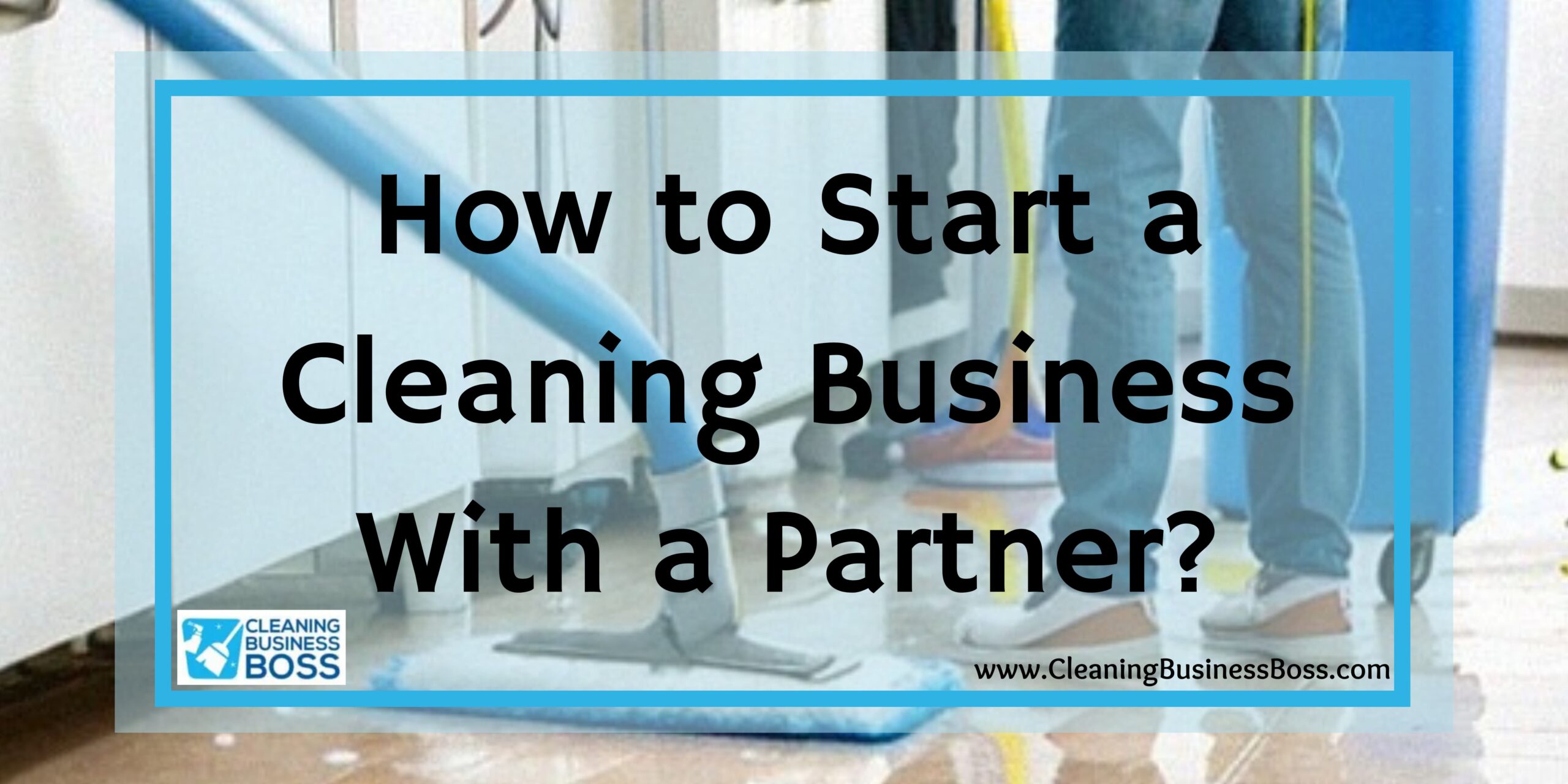As you may have guessed, we love the cleaning business — and if this post got your attention, you and a friend, neighbor, or spouse might be thinking of doing the same.
Many relationships have gone sour due to business discrepancies. Therefore, before starting a cleaning business with a partner, there are a few things you should take into consideration such as: choosing the right partner, defining tasks, developing a partnership agreement, having an ‘exit strategy,’ and managing your funds.
Trust us, these five simple things can make or break your business!
What to Consider Before Taking the Plunge
There are many things you should review before going into business with someone else. Based on our experience, the most important are:
Choosing the Right Partner
Starting a business, especially if you are doing it for the first time, is no easy task. Thus, choosing someone to help you throughout the journey can be great! Nonetheless, not all relationships (or people) are cut up to be partners. Furthermore, not everyone can start a cleaning business as it is a lot of tough and arduous work.
Therefore, the first thing you need to ask yourself is why you would want to become partners. If the only reason you can come up with is that you need help with the initial investment, then we recommend you re-think your strategy. There are many other ways in which you can acquire the necessary funding to start your project (e.g., angel investors, bank loans, etc.)
Nonetheless, if this is not your case, and you have many other valid reasons to start a company together like your passion for cleaning, customer relationship skills, and so on, you are on the right track!
Business partners should complement each other — meaning they should play into each other’s shortcomings and strengths. For instance, if you are great with the numbers, while your partner is best at managing employees. Which brings us to our next point.
Check out this article to know how to start a cleaning business on the side.
Defining Tasks & Responsibilities

Dividing roles and setting the boundaries as to where one’s job ends, and the other person’s starts are crucial to running a successful business; even more so, if you are thinking of starting a small cleaning business with limited resources.
We suggest you start by making a list of the things each of you feels more comfortable doing. Once the list is finished, take a hard look at it. You might discover that there are things you would not want to take on that your partner does. For instance, you may not be okay with cleaning toilets and degreasing kitchens, but your partner might. On the contrary, perhaps you will find that there are things you both are willing to do, such as dusting and vacuuming.
Even if that is the case, do not stress! It is crucial for you to divide the company’s tasks right from the start to avoid stepping on your partner’s toes. Overall, we learned that cleaning businesses tend to have two fronts: the “front of the house” and the “back of the house.” Do not take this literally!
What we want to express is that one side of the company entails handling clients, coordinating marketing activities, and business development; while the other takes care of the accounting, payroll, employees and other administrative tasks. From the get-go, make sure you both know what ‘front’ is yours to manage.
Developing a Partnership Agreement
In the beginning, everyone has the best intentions at hand. However, it is not until things get tough (and sometimes they will) that people start showing their true colors. Thus, we recommend you plan for the worst-case scenario to avoid misunderstandings. The best way of doing it is by drafting a partnership agreement.
Simply put, a partnership agreement is a legally binding contract between two (or more) business partners used to establish:
- Responsibilities (e.g., duties, tasks)
- Profits and loss distribution (e.g., a fixed percentage, equal share)
- General partnership rules (e.g., capital contributions, withdrawals)
- Ownership
At first, this might seem pretty abstract. However, a great way of making it easier for you is by asking yourself questions like:
- If one of us made a more significant investment, does it mean he/she gets more ownership over the company?
- When do we both get to ‘take out’ money after profits?
- What is our work schedule, vacation day policy, days off, etc.?
- What is the ownership percentage for each of us?
- If we don’t succeed, how can we dissolve the partnership?
Moreover, it is imperative for you to outline and describe each one of your tasks and responsibilities. You both need to know who would be in charge of let’s say bathrooms, and who would be doing the heavy lifting – is it one of you? Both of you? A third person? All of these questions need to be iron out (pun intended) on your agreement. Thus, when a conflict arises, you can refer back to your contract and settle disputes before they escalate.
Here you can find a great ‘Partnership Agreement’ example. However, we strongly advise you seek legal help when constituting your contract to make sure you cover all the necessary bases. It is always better to invest a few bucks and have something done right than regretting it later.
Check out this article to learn how to register your cleaning business.
Having an ‘Exit Strategy’
When drafting the previous document, questions like:
- If we don’t succeed, how can we dissolve the partnership?
- If we dissolute, who gets to keep specific assets (e.g., the company’s van)?
Answers to these questions should be taken into consideration and be part of your ‘Exit Strategy.’ An ‘Exit Strategy’ in business, defines the terms and conditions for both partners to walk away with in case of a separation. However, keep in mind that this does not necessarily mean that the business did not work out or that your partnership was a mistake. In some cases, companies dissolve because of one (or both) parts achieved their goals and wish to make a considerable profit by selling.
Whichever the case may be, dot the I’s and cross the T’s. We cannot stress this enough!
Managing Your Funds
Last but not least, learn to manage your funds. Most business partnerships end because of money issues. Therefore, learning how to keep your cash flow running is an essential part of becoming a business owner. To ensure you are running a smooth business, we recommend you:
- Draw a clear budget from the start
- Keep your payables up to date
- Do not incur unnecessary expenses
- Use credits responsibly and loans effectively
- Invest your company’s surplus for future expansion or to pay off debts
- Keep your employees happy by offering fair wages
There are many other ways in which you can manage your funds. If you (or your partner) are not well versed in math, we suggest you hire a specialist that can help you make well-thought financial business decisions. However, by no mean, we are saying that this is a must-have or that you need to include a full-time accountant or business consultant into your payroll. Simply, make sure you have someone you can trust at hand (that you can pay by the hour) if need be.
Wrapping It Up

As you can see, there are many things to consider before committing to a business partner. Remember always to evaluate who could be the best fit for the role, how you are going to divide your tasks and responsibilities, what are the terms and conditions of your business arrangement, and how are you going to manage your income and expenses to ensure you are running a successful company.
But remember, the best advice we can give you is to start a business only with someone you feel comfortable working with. Find someone that has similar goals, that is willing to put in the effort that entrepreneurship requires, and of course, that is as passionate about cleaning as you are! The key to a brand’s success is passion.
Hopefully, after reading this article, you have a clearer picture of how to start a cleaning business with a partner. Nonetheless, we have also included two of the most frequently asked questions below to guide you better.
Frequently Asked Questions
Do all partnerships need to be 50/50?

No, not all business partnerships translate into equal ownership of the company. In fact, most businesses have a different ownership percentage. There is no correct answer; the right number will be one that you both agree on.
Is starting a cleaning business with your spouse a good idea?
Starting a cleaning business is not as easy as it may seem. It requires a lot of planning and decision making on your part. Thus, to make it work, you will need to trust each other and have open communications to avoid misunderstandings. Keep in mind that starting a business with anyone (especially someone as close to you as your life partner) may affect your relationship.
To learn more on how to start your own cleaning business, check out my startup documents here.
Please note that the contents of this blog are for informational and entertainment purposes only and should not be construed as legal advice. Any action taken based on the information provided in this blog is solely at your own risk. Additionally, all images used in this blog are generated under the CC0 license of Creative Commons, which means they are free to use for any purpose without attribution.

About the author. Entrepreneur and Cleaning Business Fan.
Hi! I am Shawn and I am a happy individual who happens to be an entrepreneur. I have owned several types of businesses in my life from a coffee shop to an import and export business to an online review business plus a few more and now I create online cleaning business resources for those interested in starting new ventures. It’s demanding work but I love it. I do it for those passionate about their business and their goals. That’s why when I meet a cleaning business owner, I see myself. I know how hard the struggle is to retain clients, find good employees and keep the business growing all while trying to stay competitive.
That’s why I created Cleaning Business Boss: I want to help cleaning business owners like you build a thriving business that brings you endless joy and supports your ideal lifestyle.


